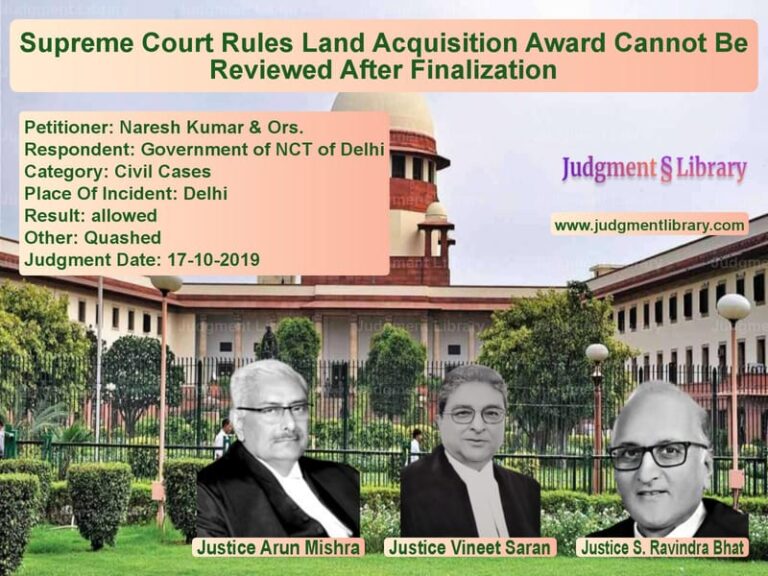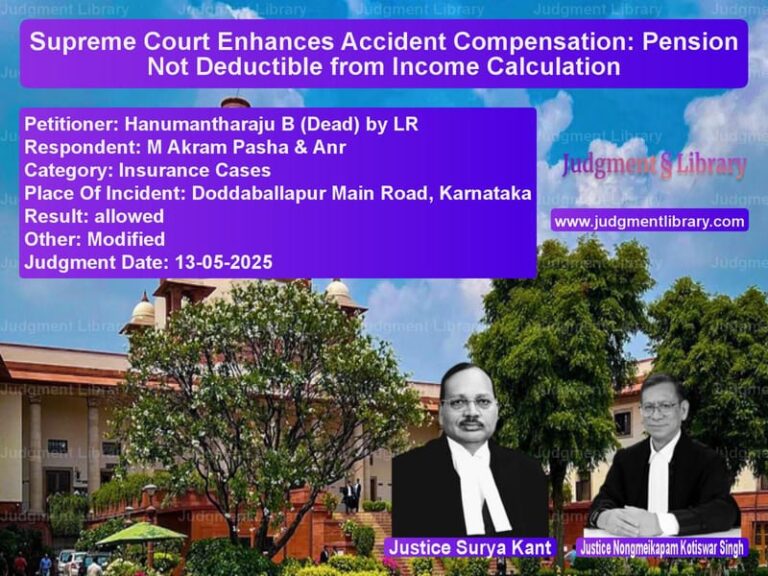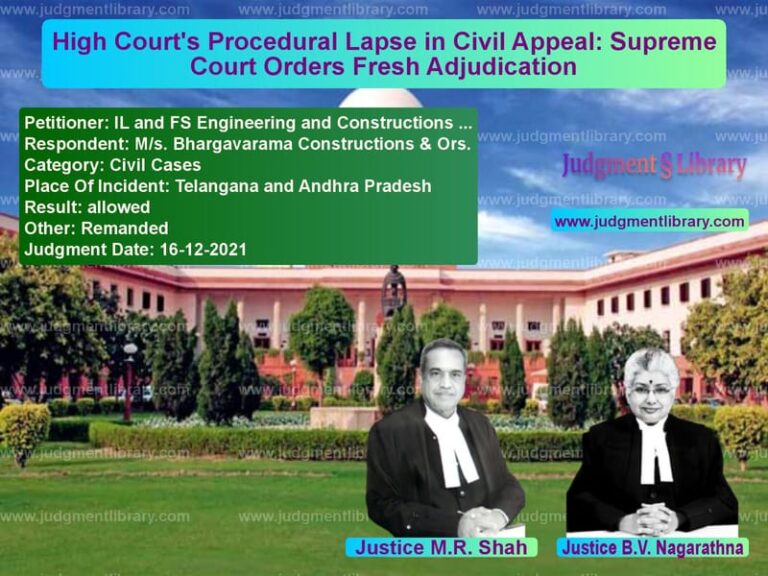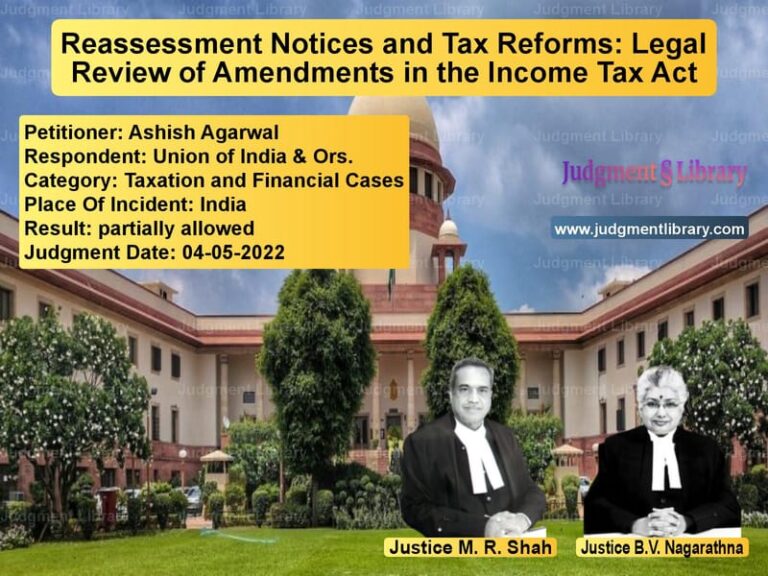Fairness in Adjudication and Disclosure of Documents: Kavi Arora vs Securities & Exchange Board of India
The case of Kavi Arora vs Securities & Exchange Board of India (SEBI) deals with a legal dispute concerning the inspection of documents and the procedural fairness in the adjudication process under the SEBI Adjudication Rules, 1995. The petitioner, Kavi Arora, challenged the SEBI’s refusal to provide certain documents and its non-compliance with the mandatory disclosure requirements under the SEBI (Procedure for Holding Inquiry and Imposing Penalties by Adjudicating Officer) Rules, 1995. The petitioner was involved in an investigation regarding alleged violations of the Securities and Exchange Board of India (Prohibition of Fraudulent and Unfair Trade Practices) Regulations, 2003 (SEBI PFUTP Regulations), which resulted in the issuance of a Show Cause Notice by SEBI.
Background of the Case
The petitioner, Kavi Arora, worked as a senior executive at Religare Enterprises Limited (REL), which was under investigation for the alleged diversion of funds and violations of SEBI regulations. SEBI appointed a forensic auditor, MSA Probe Consulting, to investigate the matter. Following the investigation, SEBI issued a Show Cause Notice (SCN) to the petitioner, alleging that funds amounting to INR 2315.66 crores were diverted from REL for the benefit of its promoters. The SCN also cited violations under Sections 11(1), 11(4), 11B(1), 11B(2), 11(4A) of the SEBI Act, 1992 and Section 12A(1) and 12A(2) of the Securities Contract (Regulation) Act, 1956 (SCR Act 1956), among others.
The petitioner requested to inspect the documents relied upon by SEBI in issuing the SCN, but SEBI only provided partial access to the documents, withholding several key documents on the grounds of confidentiality. The petitioner argued that SEBI’s refusal to provide full access to the documents, especially the forensic audit report and supporting materials, violated the principles of natural justice and the rules of fairness in adjudication.
The Petitioner’s Arguments
The petitioner, represented by Senior Counsel Mr. Sidharth Luthra, contended that the SEBI Adjudication Rules required SEBI to provide the petitioner with a full and fair opportunity to inspect all documents relied upon in the issuance of the SCN. The petitioner argued that the failure to provide access to the relevant documents, including the forensic audit report and supporting materials, prevented the petitioner from effectively defending himself. The petitioner also argued that SEBI’s refusal to disclose the documents, including critical financial records and email communications, undermined the fairness of the adjudication process.
Mr. Luthra highlighted the importance of the principles of natural justice and fairness, emphasizing that the petitioner should be given the opportunity to examine all relevant materials that formed the basis of the SCN. He argued that without access to the complete set of documents, the petitioner could not adequately respond to the allegations, and the process would be inherently unfair. He further cited several case laws, including Natwar Singh v. Directorate of Enforcement (2010) and T. Takano v. SEBI (2022), which affirmed that the disclosure of documents relied upon by the adjudicating authority is a necessary part of ensuring a fair inquiry.
The Respondent’s Arguments
The respondent, SEBI, represented by Senior Counsel Mr. Chander Uday Singh, argued that SEBI had complied with the requirements of the SEBI Adjudication Rules and had provided the petitioner with access to the relevant documents. Mr. Singh stated that the petitioner was allowed to inspect most of the documents relied upon by SEBI, but certain documents were withheld on the grounds of confidentiality, including bank statements, evidence of interviews conducted, and supporting emails.
SEBI contended that the rules did not require the disclosure of all documents, especially those not relied upon during the formation of the opinion or those that contained sensitive or confidential information. Mr. Singh argued that SEBI had provided the petitioner with ample opportunity to inspect the documents that were necessary for the petitioner’s defense and that the non-disclosure of certain documents did not impact the fairness of the proceedings. He also highlighted that SEBI had followed the proper procedure under Rule 3 of the SEBI Adjudication Rules in forming the opinion to issue the SCN and had provided the petitioner with a compact disc containing voluminous records, excluding confidential materials.
The Court’s Analysis
The Supreme Court analyzed the competing arguments of both parties, focusing on the principles of natural justice and the requirements of disclosure under the SEBI Adjudication Rules, 1995. The Court reiterated that the key issue in this case was whether SEBI had provided the petitioner with an adequate opportunity to defend himself by furnishing all relevant documents relied upon in issuing the SCN. The Court examined whether the withholding of certain documents on the grounds of confidentiality violated the principles of fairness and transparency in the adjudication process.
The Court noted that while the respondent had provided the petitioner with access to some of the documents, the refusal to disclose certain documents, including the forensic audit report and related materials, raised serious concerns. The Court emphasized that the principles of natural justice required that the party facing charges be given access to all documents that formed the basis of the allegations. The Court referred to the judgment in Natwar Singh v. Directorate of Enforcement (2010), where it was held that an adjudicating authority must disclose all documents upon which it intends to rely in forming its opinion, to ensure that the noticee has a fair opportunity to respond.
Final Judgment
The Supreme Court allowed the petition and ruled that SEBI had violated the principles of natural justice by withholding certain critical documents that were relied upon in the formation of the opinion to issue the SCN. The Court held that the non-disclosure of these documents, including the forensic audit report and related materials, had deprived the petitioner of a fair opportunity to defend himself. The Court directed SEBI to provide the petitioner with access to all documents relied upon in the issuance of the SCN and further directed SEBI to comply with the requirements of the SEBI Adjudication Rules regarding the disclosure of documents in future proceedings.
The Court also emphasized the importance of adhering to procedural fairness in regulatory proceedings and the need to ensure that the principles of natural justice are upheld in all adjudicatory processes. The judgment reinforced the idea that transparency and disclosure are fundamental to ensuring fairness in proceedings involving serious allegations and potential penalties.
Significance of the Judgment
This judgment is significant in reinforcing the importance of fairness and transparency in regulatory proceedings. The Court’s decision highlights that regulatory bodies like SEBI must adhere to the principles of natural justice, including the requirement to disclose all documents relied upon in issuing show-cause notices or taking any adverse action. The judgment serves as a reminder that the fairness of proceedings cannot be compromised, even in complex financial and regulatory matters, and that the right to a fair hearing includes access to all relevant evidence.
By ordering SEBI to disclose the withheld documents, the Court upheld the integrity of the legal process and ensured that the petitioner was given a fair opportunity to present his defense. The ruling also reinforces the notion that regulatory authorities must operate with transparency and accountability, particularly in cases where serious consequences, such as penalties and sanctions, are at stake.
Petitioner Name: Kavi Arora.Respondent Name: Securities & Exchange Board of India.Judgment By: Justice Indira Banerjee, Justice A.S. Bopanna.Place Of Incident: New Delhi, India.Judgment Date: 14-09-2022.
Don’t miss out on the full details! Download the complete judgment in PDF format below and gain valuable insights instantly!
Download Judgment: kavi-arora-vs-securities-&-exchang-supreme-court-of-india-judgment-dated-14-09-2022.pdf
Directly Download Judgment: Directly download this Judgment
See all petitions in Company Law
See all petitions in unfair trade practices
See all petitions in Judgment by Indira Banerjee
See all petitions in Judgment by A. S. Bopanna
See all petitions in allowed
See all petitions in Quashed
See all petitions in supreme court of India judgments September 2022
See all petitions in 2022 judgments
See all posts in Corporate and Commercial Cases Category
See all allowed petitions in Corporate and Commercial Cases Category
See all Dismissed petitions in Corporate and Commercial Cases Category
See all partially allowed petitions in Corporate and Commercial Cases Category







